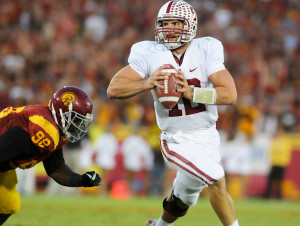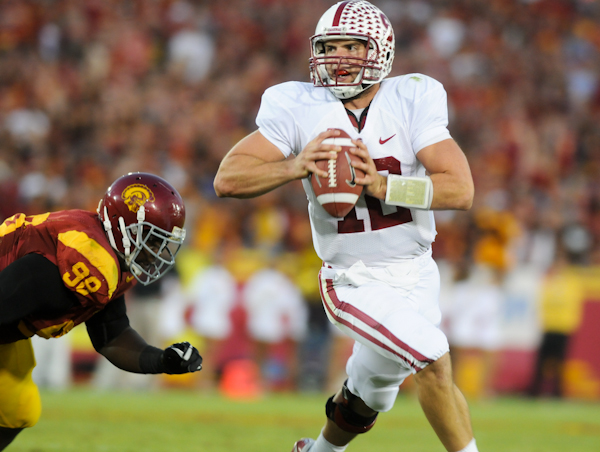When the Indianapolis Colts picked Cardinal quarterback Andrew Luck first overall in the NFL draft on Thursday night, it marked the fourth time a Stanford signal-caller has been taken first overall. Luck joined the illustrious club of Bobby Garrett, Jim Plunkett and John Elway as the four Cardinal first picks, and Stanford is now one of just five schools to have four or more players taken first overall.

And while Luck’s selection was a huge media event, watched by millions of football fans all over the globe, a dig through The Stanford Daily’s archives reveals that the distinction of being picked first overall in the NFL draft has changed quite a bit over the years. A look back at the days that Garrett, Plunkett and Elway were drafted first overall reveals an incredible amount about how Stanford, the NFL and the United States have changed over the last 60 years.
Bobby Garrett, Cleveland Browns, 1954 Draft
Garrett, a Los Angeles native, was an All-American quarterback and an outstanding defensive back for the Stanford Indians in the early 1950s. Garrett’s exploits earned him both the MVP of the 1954 Hula Bowl and the W.J. Voit Memorial Trophy as the most outstanding football player on the West Coast.
Back then, the NFL was still a fledgling league with just 12 teams (only two on the West Coast) and the draft was far different than it is today. Instead of seven rounds, the 1954 draft had 30 rounds, and a peculiar quirk called the “bonus pick.” Today, the team with the worst record in the NFL is guaranteed to pick first overall, but the drafts of the 1940s and 50s tossed every team’s name into a random lottery, and the winner of the lottery got to pick first overall.
Under the tutelage of future Hall of Fame coach Paul Brown, the 1953 Cleveland Browns went 11-1 in the regular season, then lost the NFL Championship Game to the Detroit Lions, 17-16, in a rematch of the 1952 NFL title game. The Browns were the dominant force of the early ’50s, going to six consecutive championship games after joining the league in 1950, but they had the good fortune of winning the “bonus pick” lottery, allowing them the opportunity to add to their already stacked team.
The Browns were hoping to find a successor to aging quarterback Otto Graham (another future Hall of Famer) and thus picked Garrett first overall.
“I am perfectly delighted to have been chosen by the Browns,” Garrett said in the Jan. 29, 1954 edition of The Daily. “I consider Paul Brown one of the great coaches in the game.”
However, Garrett was unsure whether or not he would take his talents to the NFL, as the United States was still in the final stages of the Korean War.
“I’m in the Air ROTC, but it is still not sure whether or not I will be called,” Garrett said.
Eventually, Garrett did make it to the NFL, where his career flamed out faster than perhaps any first pick in NFL history. First, Garrett was traded to the Green Bay Packers before training camp even started. Next, he had to serve two years in the Air Force, forcing him away from the game of football. After his two years of military service, the Browns reacquired Garrett from the Packers in another trade.
Finally, when he got to Cleveland, the Browns discovered that Garrett couldn’t possibly play quarterback in the NFL — he stuttered so badly that it was impossible for him to even call plays in the huddle.
In the end, Bobby Garrett, the No. 1 pick in the 1954 draft, only played nine games in the NFL.
Jim Plunkett, New England Patriots, 1971
By 1971, the NFL was a much larger enterprise, as the league had merged with the popular American Football League in 1970, and the first-ever Super Bowl had been played just four year beforehand. Plunkett, who had captured the 1970 Heisman Trophy, was selected first by the Boston Patriots, who were coming off a dreadful 2-12 season.
While the Patriots entertained trade offers from 17 of the 25 other teams in the league, they eventually picked Plunkett, calling him at 7:04 a.m. to tell him he was a Patriot.
“I feel honored to be picked first, I just feel great about it,” Plunkett told The Daily on Jan. 29, 1971. “It will be great to play with Boston. I feel I can play right now as a pro, but I don’t expect to play right away.”
“He’s the Joe Namath of the future,” Indians head coach John Mazur told The Daily.
Ole Miss quarterback Archie Manning, the second-runner up for the Heisman trophy and the father-to-be of Peyton and Eli Manning, was selected second overall by the New Orleans Saints, and the Houston Oilers picked Santa Clara quarterback Dan Pastorini with the third overall choice.
Plunkett wasn’t quite the smash hit that Mazur expected him to be, as he struggled mightily after his rookie season. After five years with the Patriots, he was traded to the San Francisco 49ers and then released after a 5-9 season in 1977.
Plunkett then finally regained that magic touch that made him the first overall pick when he joined the Oakland Raiders in 1978. He eventually stepped into the starting role in 1980 after Pastorini, the Raiders’ starter, went down with a broken leg, and Plunkett went on to lead the silver and black to Super Bowl victories in 1981 and 1984.
John Elway, Baltimore Colts, 1983
Elway, the runner-up to Georgia running back Herschel Walker for the 1982 Heisman, was sure to be a superstar professional athlete — but he wasn’t sure whether that would be in professional baseball or football.
The Baltimore Colts, picking first overall after a 0-8-1 campaign in the strike-shortened 1982 season, clearly wished to pick the strong-armed Californian, but Elway wasn’t having it. After the Colts picked him first overall (Walker was picked first by the United States Football League’s New Jersey Generals), Elway insisted he would join the New York Yankees organization if the Colts did not trade him to a “West Coast team or a (NFL) contender,” the April 27, 1983 issue of The Daily reported.
Elway made his ire toward the Colts clear, especially during a bitter phone call with Colts head coach Frank Kush.
“I said, ‘Mr. Kush, I don’t want to be a jerk or anything, but we’ve told you for the past three months that I don’t want to play for Baltimore. And I know for a fact you’ve been offered three (first-round picks) and a quarterback and you turned that down. And right now you’ve got nothing.’ And then I hung up the phone,” Elway said.
Eventually, Elway’s fit garnered him the trade he so desired, as he joined the other equine NFL team when the Colts traded him to the Denver Broncos, who had gone 2-7 in 1982, on May 2.
This time, Elway’s response was much different.
“I’m definitely thrilled to be here,” Elway told The Daily on May 3. “It’s something I didn’t expect to happen. I’m glad to be playing in the NFL and I’m glad to be playing for the Denver Broncos.”
Elway would play for the Broncos for the next 15 years, taking them to five Super Bowls and winning two in the final two years of his career.
Clearly, the NFL draft has changed immensely over the past 60 years, and it’s interesting to consider how some of the players in the careers of Plunkett and Elway have already affected Luck’s week-old NFL career. After all, Archie Manning, who was drafted right after Plunkett, is the father of Peyton Manning, the man Luck will be replacing with the Colts, who was signed this offseason by the John Elway, the Executive Vice President of Football Operations for the Denver Broncos. Today, it’s impossible to know what the trajectory of Luck’s career will look like, but perhaps only one thing is for sure — Luck probably wants his career to look more like that of Plunkett or Elway than that of Bobby Garrett.
